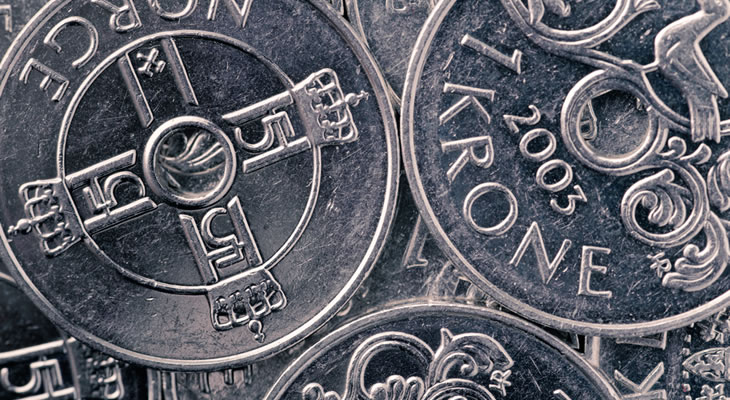Pound Sterling Norwegian Krone (GBP/NOK) Exchange Rate Slides on Unemployment and Oil Gains
The Pound Sterling Norwegian Krone (GBP/NOK) exchange rate slumped by around -0.3% on Friday morning. This left the pairing trading at around 11.8450Kr.
The Norwegian Krone was offered support this morning after the country’s unemployment rate fell in June.
The latest labour market statistics showed Norway’s unemployment rate fell back to 4.8% in June from May’s 6.4%.
This was a stark improvement after the jobless rate jumped to 10.4% in March due to the coronavirus pandemic.
The Krone was also offered support this morning as oil prices were headed for a weekly gain.
Although, worries about a spike of coronavirus cases has sparked concern the rebound in oil demand could stall. This likely limited NOK gains.
UK Services PMI Hits Four-Month High
The Pound edged lower after the highly anticipated services PMI remained in contraction territory, but improved after April’s record low.
The UK services PMI rose from May’s 29 to 47.1 in June as new orders fell at a slower pace and business expectations hit a four-month high.
Markit’s data showed that around 33% of businesses reported a fall in activity last month, while 28% said activity expanded.
The report indicated that the easing of lockdown restrictions had been favourable impact on the sector. However, data also highlighted a steep decline in employment.
Commenting on the latest PMI data, Markit’s Economics Director, Tim Moore noted:
‘June data highlights that the worst phase of the service sector downturn has passed as more businesses start to reopen and adapt their operations to meet social distancing requirements. The proportion of service providers reporting a drop in business activity has progressively eased after reaching a peak of 79% in April. Around 33% of the survey panel signalled a reduction in business activity during June, which compared with 54% in May.
‘The latest UK Services PMI data highlighted another steep decline in employment numbers, despite a rebound in business expectations for the year ahead. Service providers widely commented on fears of a slow recovery in customer demand and an immediate need to reduce overheads. Moreover, survey respondents often noted the high cost of adapting operations during the COVID-19 pandemic, coupled with constrained business capacity and difficulties passing on rising expenses to clients.’
Sterling (GBP) Falls as Factories Plan ‘Painful’ Redundancies
The Pound remained under pressure today after a survey from Made UK revealed British factories are planning to lay off workers.
This is a stark warning sign for Britain’s economy as it tries to recover from the coronavirus pandemic.
Made UK said that around 46% of manufacturers are expecting to make redundancies over the next six months. This was up sharply from 25% just a month earlier, sending GBP/NOK lower.
According to Stephen Phipson, chief executive of Make UK:
‘Conditions are still very tough for many companies with disruption likely to continue for some time.
‘This has led some to reluctantly conclude that with demand unlikely to return for some time, if at all, they are moving to the painful choice of redundancy.’
However, the Pound received a slight upswing of support after data showed British consumers were growing increasingly optimistic.
GfK’s data showed that confidence improved from -30 to -27, which is the highest level of confidence since the lockdown began.
Pound Norwegian Krone Outlook: Will GBP Claw Back This Week’s Losses?
Looking ahead, the Pound (GBP) could edge higher against the Norwegian Krone (NOK) at the start of next week’s session following the release of further PMI data.
If June’s UK construction PMI rises higher than expected as the contraction in the sector slows, it will boost Sterling.
However, any gains made on Monday could soon be reversed on Tuesday following a slew of data from Norway.
If Norway’s manufacturing and industrial production rise higher than forecast, it will boost Krone. This will send the Pound Norwegian Krone (GBP/NOK) exchange rate lower.


Comments are closed.